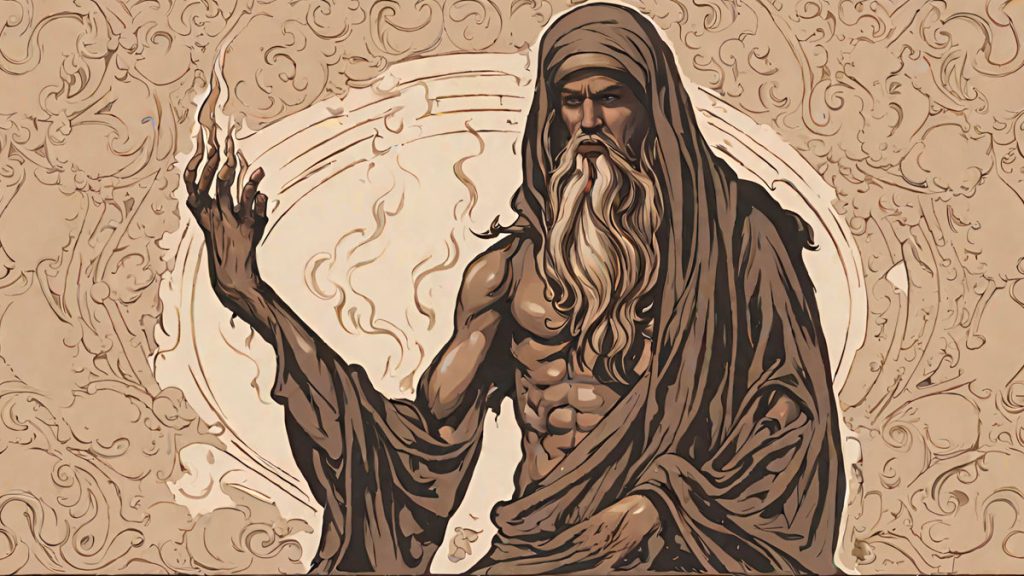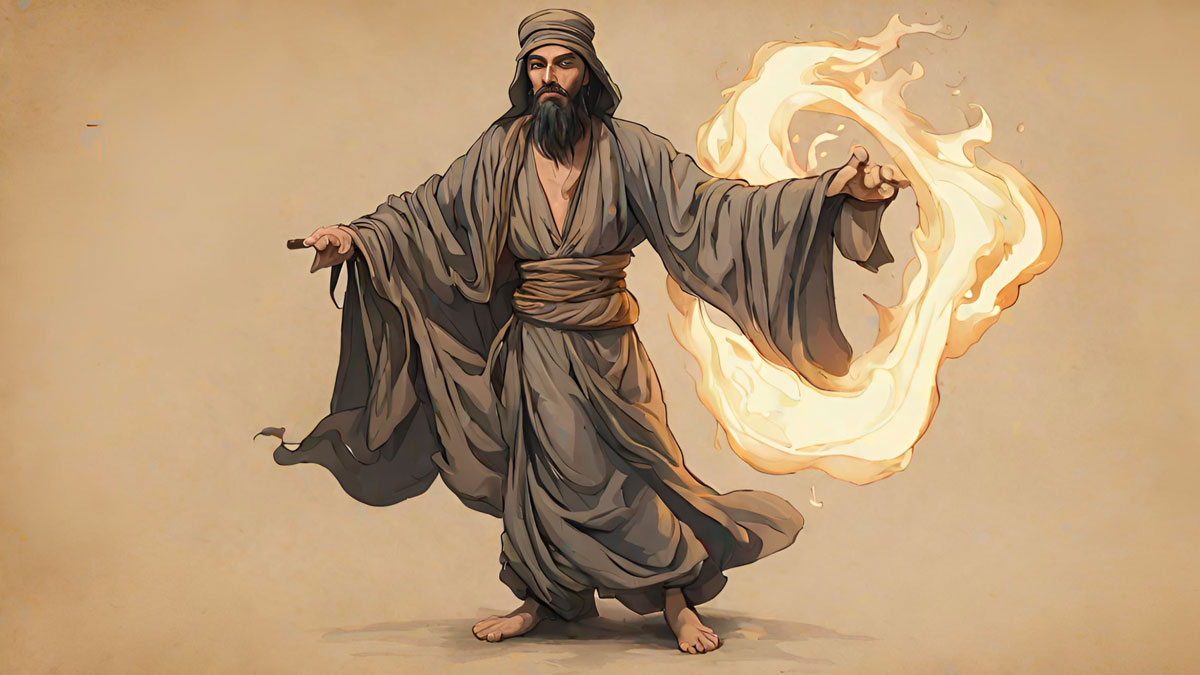A jinn is a type of mythical being prevalent within Islamic teachings and Arabian folklore. It is a feature throughout the Middle East and in other Muslim communities around the world.
The jinn are powerful beings with superhuman strengths combined with the ability to perform magic and shapeshift into other creatures and objects. The name is often used as an umbrella term for a variety of creatures that are neither human nor angels; for example, ghouls, shaitan, ifrit, marid, and sila are all considered to be types of jinn. According to Islamic scripture, jinn and humans are the only intelligent beings to inhabit Earth.
The original origins of the jinn are unknown and fiercely contested, but they are thought to have featured in pre-Islamic cultures when they appeared in folktales told as far back as the period of the Roman Empire.
However, the role of the jinn has become hugely important within Islam. There is an entire Surah (chapter) devoted to the jinn in the Quran, and they regularly appear in the Hadiths, which are the collection of documents that supposedly record the actions and words of the prophet Muhammad.
The jinn has entered into Western consciousness as the genie from the story of Aladdin’s Lamp. Western audiences first came across genies on a mass scale through a French translation of a collection of Arabian folklore called A Thousand and One Nights, also known as the Arabian Nights.
The Jinn are an essential feature in Islamic scripture
Al-Jinn, the 72nd chapter of the Quran, explains that the jinn were created by God from fire, in contrast to humans, who were created from soil, and angels, who were made from light. Section 15:26-27 of the Quran reads, “Indeed, We created man from dried clay of black smooth mud. And We created the Jinn before that from the smokeless flame of fire.” The jinn are thought to have existed a long time before humans.

Islamic teachings state that the Jinn considered themselves to be superior to humans, so they were angered when God ordered them to bow before the humans. This has subsequently caused friction between the Jinn and humans, which will likely last until judgment day.
The devil in Islam is known as Iblis, or shaitan, when performing evil deeds, and he is a jinn. The scriptures state that as an orphan, Iblis was taken into heaven by the angels, but he was cast out when he refused to bow to humans. Iblis was allowed to remain living until judgment day and has made it his goal to lead humans astray. Shaitan demons are Iblis’s followers, who work hard to cause misfortune to humans. Some scholars say that all Jinn are descended from Iblis.
However, not all jinn are evil. They have free will and, therefore, have the power to do good. They can be either Muslim or follow another religion, Though, of course, Islamic teachings would prefer them to be Muslim.
One Hadith, reported by Ibn Mas‘ud, actually states that all humans have a jinn assigned to them. The Hadith reads, “The Prophet Muhammad said: ‘There is not one of you who does not have a jinnī appointed to be his constant companion.'”
Habitat and characteristics of a Jinn
The jinn live on Earth but inhabit a spiritual sphere or parallel world that is generally unseen to humans. They can, unlike humans, travel between their world and our world. In the human world, they are generally found in areas considered impure, such as dark or dirty places. These could include caves, graveyards, or garbage dumps, anywhere likely to be dark and secluded.
The creatures have many similarities with humans; they eat and drink, form relationships, and have families. Some believe in a God, whereas others don’t, and some are good while others are evil. As well as powers such as strength, speed, and shapeshifting, they also live very long lives.
However, Islamic scholars stress that despite these extraordinary powers, humans are actually the superior beings. They are thought to be less virtuous and physical than humans. The jinn have one other very important power: the ability to possess humans.
Human possession by a Jinn
In a paper for the National Center for Biotechnology Information, Najat Khalifa and Tim Hardie documented a supposed case of possession by a jinn. A 25-year-old woman from Iraq reportedly became withdrawn from her family and friends. She stopped talking and worryingly ceased eating.
The woman, who had no history of mental illness, was subjected to electro-convulsive therapy, which did not affect the patient. Her family reportedly concluded that she was possessed by a jinn and took her to a faith healer. She was then subjected to traditional Islamic healing ceremonies, and over time, she recommenced eating and began to recover. The patient later claimed she had been aware of her surroundings but was unable to speak out. She could not explain what happened to her but insisted she had not been suffering from mental illness.
Many Muslims do not fear the jinn and have spoken positively about their experiences with them; indeed, some families claim that a jinn lives with them, much like how a Western family might speak about a ghost living with them, which can be friendly.
Jinns living with humans
Anthropologist Naveed Khan documented an experience in Lahore, Pakistan, in 2001 when she visited the home of a fellow researcher and Urdu teacher and was told the family had a resident, jinn, called Sulayman. The family had been given the jinn by the son of a magician who had inherited a group of jinn and passed them on to families he considered to be good Muslims.
Sulayman had lived with the family for many years and had communicated with them through their young daughter. Young children are often seen as suitable conduits for the jinn as they are not yet old enough to have religious obligations.
Sulayman the jinn spoke mostly with the family about God and Muhammad and soon became a big deal in the neighborhood. Women would visit the home to ask the jinn for help with anything from finding lost items to securing marriages. Khan’s colleague told her that, one day, the jinn eventually went home. Reportedly, the family were happy to see Sulayman go as they feared they had become too reliant on the jinn.
According to the Pew Research Center, a study done in 2012 showed that over half of Muslims believed in the jinn. In Morrocco and Bangladesh, two countries geographically at opposite ends of the Mulsim world, over 80 percent said they believed in jinn.
Origins of the Jinn remain a mystery
The true origins of the jinn myth are shrouded in mystery. Amira El-Zein contends that similar creatures have featured in multiple cultures, including Assyria, Babylon, ancient Greece, and ancient Egypt, as well as in Japan, Persia, and Ireland, along with everywhere else in between. Numerous cultures worldwide have featured mysterious fairy-like creatures who are not the undead but a secretive species that inhabit an unseen parallel world.

Some scholars argue that the word jinn comes from the Arabic word Jannah, which means heaven, implying that jinn were originally beings close to heaven. Others state jinn comes from the word Janna, which means to hide or conceal.
References
El-Zein, Amira. “Islam, Arabs, and Intelligent World of the Jinn,” (2009), Syracuse University Press, accessed March 15, 2024.
Gershon, Livia. “Life with a Jinni,” in Jstor, accessed March 15, 2024.
Khalifa, Najat and Hardie, Tim. “Possession and jinn,” in National Center for Biotechnology Information, accessed March 15, 2024.
Laughlin, Vivian A. “A Brief Overview of al Jinn within Islamic Cosmology and Religiosity,” in Journal of Adventist Mission Studies, Vol. 11 [2015], No. 1, Art. 9, accessed March 15, 2024.
Maududi, Abul A’la. “72. Jinn,” in Chapter Introductions to the Quran, (International Islamic University Malaysia), accessed March 15, 2024.
NewMuslimEssentials.com, “The Unseen Creatures: Angels and Jinn,” accessed March 15, 2024.
Pew Research Center, “Other Beliefs and Practices,” in The World’s Muslims: Unity and Diversity, accessed March 15, 2024.
